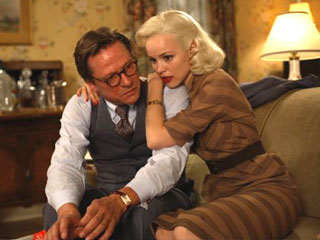Watch the trailer for "Married Life"

Married Life
The opening credits sequence can do so much to establish the tone of the film we are about to see, which may be why so many filmmakers no longer like to use them: I suppose they disdain having to provide a précis of work that plans to take its time leading us in different directions. The independent film Married Life has opening credits that do their best to evoke a certain time and mood.
Cartoon images of lovers in clothes and decors of the 1940s cavort playfully as we hear “I Can’t Give You Anything But Love,” a song that bespeaks a champagne elegance and, for the movie buffs in the house, recalls
Bringing Up Baby, that classic of screwball comedy, a genre that viewed love as a battlefield. After that I was expecting something perhaps along the lines of the current
Miss Pettigrew Lives for a Day. Instead, the film is—well, I’m not quite sure how to classify it. It seems to me that director Ira Sachs works so hard to lull you into thinking that his film is something it’s not that he never quite clarifies what it is that he does want it to be. The plot: In 1949, respectable citizen Harry (Chris Cooper) wants to leave his wife of many years, Pat (Patricia Clarkson) for a younger woman.
He’s so decent, though, that he can’t bear the thought of ruining her life with a divorce, especially when she is so devoted to him. But because he also can’t live without the true love he has found in the arms of Kay (Rachel McAdams), he decides that the only humane thing to do is to kill his wife. Along the way he makes the mistake of introducing Kay to his bachelor friend Richard (Pierce Brosnan), who decides he wants her for himself. What initially looks like a dry black comedy grows more serious as it goes along, though so slowly that it takes us awhile to note it. And it isn’t until the end that we realize that we have somehow been lured into fairly straight-faced melodrama about love and identity, as if taken from Douglas Sirk through Todd Haynes’
Far From Heaven. It gets slower as it proceeds, trying to pull suspense out of the unlikeliest places. The script (by Hayes and Oren Moverman) is filled with weirdly distracting bits of dialogue that were probably pulled intact from the story’s source, a British pulp novel written decades ago. It’s hard to believe that Sachs made a movie that isn’t what he wanted it to be—it seems far too tightly controlled. But what it is that he’s getting at escaped me entirely.
—m. faust










 Current Issue
Current Issue